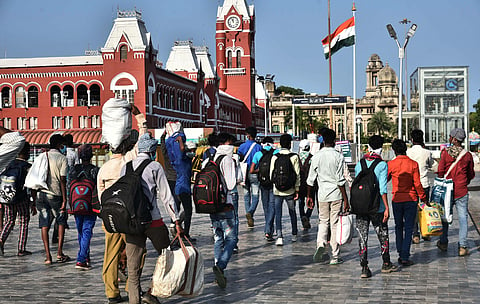

NEW DELHI/ MUMBAI: Even after the Centre issued a ‘clarification’ stating that only ‘distressed’ and ‘stranded’ migrant workers will be allowed to travel, the issue of their movement continued to affect coordination among the states and resulted in a lot of confusion.
States, which were found to be work at cross-purposes, remained unsure in the implementation of the Centre’s directives. Experts said that the teething issues in coordination between the states could have been avoided had the Centre planned the exercise in advance.
Movement by buses
Movement of stranded labourers was allowed on April 29 but only via buses. The delay in allowing movement added to the confusion among the states.
Movement by trains
On May 1 the Centre allowed movement of migrants by trains. But this directive received a lot of flak for charging passengers for their travel. However, the Centre had to roll it back
Definition of distressed
Sunday’s clarification which specified that its order was only to ‘facilitate the movement of such stranded persons, who had moved from their native places/workplaces, just before the lockdown period, but could not return to their native places/workplaces on account of restrictions placed on movement of persons and vehicles as part of lockdown measures’ created a new problem. How were the ‘stranded’ and ‘distressed’ persons to be identified?
“The government doesn’t have any authentic data on migrant labourers engaged in various informal sectors. The question that arises is if the government collected any data on distressed workers from the destination states when the lockdown was announced. While a significant majority of workers may be already in distress because of their poor earnings, the situation for another section was compounded due to the lockdown,” said Umi Daniel, director, migration and education at Aide et Action International.
States in-fighting
Migrant workers from Uttar Pradesh, Punjab and Karnataka have to wait longer in Maharashtra because their respective states have put stringent terms and conditions on their travel. Bhushan Gagrani, in-charge of war room for Covid-19 in Maharashtra confirmed the same. “They told us unless and until the Covid-19 test was not carried out, the migrants should not be sent to their home states. Therefore, Maharashtra government has decided to send the other states migrants except for those from these three states,” Gagrani said.
Maharashtra minority minister Nawab Malik also said that Uttar Pradesh Chief Minister Yogi Adityanath had refused to take his state migrants. Hence, the Maharashtra government has agreed to do a primary health check and allow migrants to go back to their native’s places. “This is crisis time. We cannot fulfil all terms and conditions set by UP. Bihar, Rajasthan and Madya Pradesh government are ready to take their people so very soon the trains will be started for them,” Malik said.
“If advance notices were given to the states and migrants before the lockdown, it would have not led to this mismanagement. It is a big problem. Practical problems were not taken into account while issuing orders. Common policy in consultation with the states would have avoided problems. For instance, whether testing of migrants is to be done in their residing states or their home states, it should have been specified,” said former Home Secretary GK Pillai.